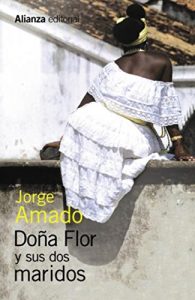Literature in Portuguese finds in a Jorge Amado located on the other side of the Atlantic, the best generational replica Saramago o Wolf Antunes. From the Portugal of the two monsters mentioned above to the Brazil of a Beloved in charge of carrying the narrative baton of the Amazon country during the middle of the XNUMXth century.
Because when, after the forties, Jorge Amado gave himself up to literature in its novelistic or essayistic aspect, he was already having his good life journey. With a vital background from which to offer that vision of the world that is all narration.
And he almost always chose the small, the symbolic, the anecdotal as a necessary starting point from which to tune in with every reader. From that reduction to the minimum exponent of the everyday, Amado was already busy erecting his plots towards that exalted point of humanity that is passion, life and death. Almost always from the Brazilian state of Bahia to the world.
Of course, there is nothing better than the scenarios where poverty makes its home to rethink the existence more attached to the land, to what there is, to survival without frills, vagueness, or superfluous possessions. The action in Jorge Amado is life, extreme adventure, passion and uncertainty as narrative tension. Fusion between work and life as in few cases occurs.
Top 3 recommended novels by Jorge Amado
Captains of the arena
Stated to talk about lives on the tightrope, of survival as the only goal, nothing better than to contemplate it from a youth as insolent and daring as it is submissive to a hand that knows how to handle the strings.
The usual youth gangs are, depending on which countries and neighborhoods, perfect breeding grounds for nurturing hitmen with young souls looking to perdition as the only possible religion since hope disappeared from the horizon before even abandoning childhood. A novel set in Salvador de Bahía, "Capitanes de la Arena" revolves around a gang of young criminals who, taking refuge in a forgotten area of the port, ravage the city.
Jorge Amado's characterization of these children thrown into crime, knowing the most sordid aspects of the struggle for existence, is one of the greatest achievements of the popular Brazilian writer. The picaresque and tenderness, the search for survival and the sense of solidarity are outstanding features of this novel in which lyricism and crudeness are intertwined.
Gabriela, cloves and cinnamon
Yes, there were and there will be. I mean fatal women (just as there will also be fatal men). The question is to exploit the resources, to know how to compensate the magic of attraction and beauty with a sibylline intelligence in order to emerge from the shadows of misery. That's when a fatal woman has everything justified, even the most Machiavellian of ideas to achieve some social justice.
When Gabriela, a beautiful illiterate mulatto woman, arrives in Ilhéus, a city in the Brazilian state of Bahia, fleeing the countryside and misery, a fun cluster of human passions is unleashed in a motley setting brimming with flavors, colors and smells. The suggestive Gabriela, her lover -the picturesque and pragmatic Nacib-, the unique Reis sisters and the eternally in love Professor Josué are just the main characters in this unforgettable novel by the Brazilian writer Jorge Amado who, steeped in a vitalism and sensuality deeply linked to the culture and customs of his native Bay, is a celebration of existence and humor.
Doña Flor and her two husbands
As much as these are stereotypes, it cannot be denied that the most impulsive sensuality is the heritage of places like Brazil, Cuba or many other countries in the Caribbean, Central America or South America. And that passion can also take shape in literature, as Jorge Amado demonstrated in this book.
Only, as the exquisite narrator that he was, Amado covers everything with the proper Latin idiosyncrasy, with an imaginary as full of saints as it is of naked bodies, of a reason always in due connivance with the carnal to be able to have fit and sustenance in these parts. where love and passion coexist in absolute tension, as best they can.
Suddenly widowed at thirty, Doña Flor, always torn between will and instinct, marries Teodoro, the methodical and modest pharmacist from Bahia, with whom she intends to stabilize her life. But, to her surprise, she will soon be required again by her first husband, the incorrigible Vadinho, a sensual, lazy and party animal skull who will return from beyond with his lovemaking abilities intact, ready to put the relationship of the exemplary couple to the test. . An unforgettable novel that captures all the flavor, humor and charm of Bahian life.



